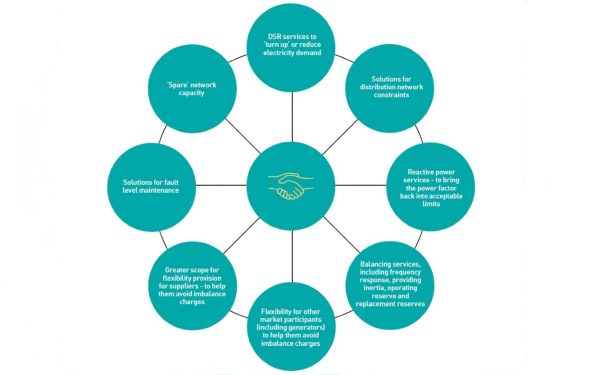Elexon is proposing that nationwide electricity ‘flexibility platforms’ are set up so that offers to provide ‘demand-side response’, or output from electricity storage facilities can be traded easily.
The buyers of storage output or demand-side response (DSR) services could include local electricity Distribution Network Operators (DNOs) suppliers and businesses.
What is ‘Demand-Side Response’?
DSR is where consumers offer to reduce or increase consumption when asked to do so by a network owner or supplier. In the future, aggregators are likely to play a bigger role in helping consumers to provide these services.
Battery storage, and electric ‘vehicle to grid’ technology are other examples of how more flexibility can be provided to the electricity system. For example, either of these technologies could increase consumption at times of the day when there is a surplus of electricity on the system, or export power on to the networks when supply and demand is tight.
However, currently aggregators, DSR providers, and storage operators have no choice but to sell their services to the DNOs.
The benefits of flexible markets
We believe wider markets for providing these valuable services need to be created. In our latest Policy View Setting up Electricity Flexibility Platforms, we explain how they could provide a more open, transparent and competitive way to trade them.
The platforms would also provide a route for trading spare capacity on DNO networks. This could help to speed up connections for renewable generators, or other users by giving them options to buy capacity and get a grid connection more quickly.
The platforms would work like markets for trading a variety of other commodities where software provided by independent companies allows a variety of products to be traded.
These companies would work closely with DNOs and aggregators to set up the exchanges. We believe that Ofgem could establish a regulatory framework governing the use of the exchanges.
Products and services that can be traded on flexibility platforms
Services and products that provide value right across the supply chain from ‘connection to the plug’ can be traded on flexibility exchanges. These include:
- DSR services to ‘turn up’ or reduce electricity demand.
- Solutions for distribution network constraints.
- Reactive power services – to bring the power factor back into acceptable limits.
- Balancing services, including frequency response, providing inertia, operating reserve and replacement reserves.
- Flexibility for other market participants (including generators) to help them avoid imbalance charges.
- Greater scope for flexibility provision for suppliers – to help them avoid imbalance charges.
- Solutions for fault level maintenance.
- Spare’ network capacity.
Benefits of flexibility exchanges

- Markets develop based on the needs of flexibility buyers and sellers.
- Value for money by having multiple buyers and sellers for flexibility services.
- Greater competition for flexibility products.
- Confidence in prices offered for flexibility products.
- Dynamic pricing to facilitate a more fluid market.
- More efficient and effective use of network capacity, potentially aiding decarbonisation targets.
- Reducing connection queues and speeding up the time it takes to connect.


